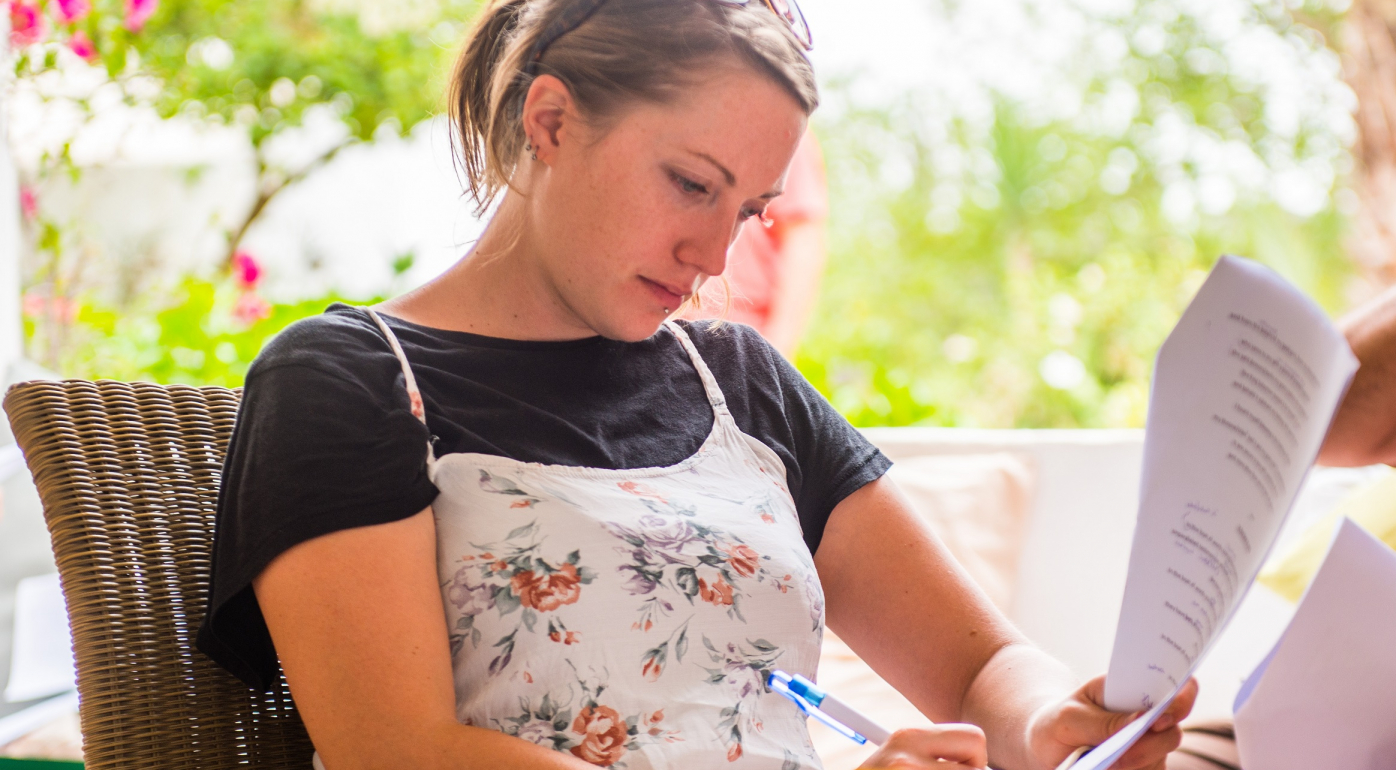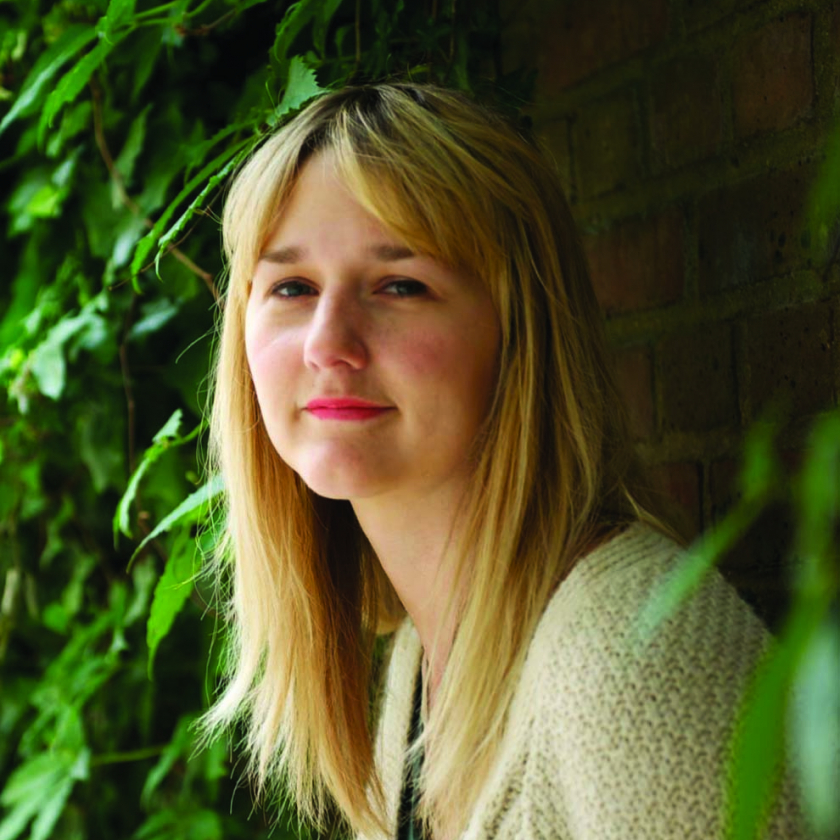There’s nothing quite so transformative as reading your own work through the lens of another language. I arrived in Tunisia on a Tuesday evening in September without a word of Arabic, exhausted after a day plagued by headaches and airport queues, and disorientated in the unfamiliar night of a new country. Victoria Adukwei Bulley, Clare Pollard and I arrived at the hotel heavy with sleep (though Victoria and I couldn’t resist walking down the boardwalk to the beach to look at the stars before we turned in) and located our rooms to the sound of hundreds of tiny finches yammering in the trees.
What followed over the next three days feels quite dreamlike, now, from where I stand back in London. Each day, after a breakfast of white cheese, roasted vegetables, fruit, hot bread and coffee, our bus picked us up and drove us down the road lined thickly with broad-limbed cacti bristling with sunset-coloured prickly pears, until we pulled up outside the beautiful, whitewashed Villa Ma’amoura. Here, the owners grow organic vegetables, including aubergines, cauliflower, ruby-red chillies for harissa, and fresh peppermint that went into the tea we drank during the breaks in our intense hours of work.

Clare Pollard and Tony Calderbank lead the workshop
We worked first as a large collective of twenty or so, under the expert tutelage of workshop leaders Clare Pollard and Tony Calderbank, to pull one of my own poems into Arabic, and one by Nassima Raoui into English, as a collaborative effort, which is an experience I won’t soon forget. After a short break we split into our smaller groups. In threes (British poet, Maghreb poet, and translator) we installed ourselves in the many corners of the house – on the hot terraces facing the sea, in the cool, dark rooms, in the hammock in the garden – and began work on the translations of each other’s poems, from and into English, Arabic, Arabic dialect, and Tamazight, that we will finesse over the coming months.

Fadhila Bechar (Algeria) reads her work in Tamazight
I am paired with Zouleikha Elhamed, from Mauritania, and Fatima Balkhayrat from Libya, working with the translator Noureddine Fekir to understand fine points of image and symbol suggested by the bridge translations. I didn’t know, then, though I learnt a little as the week progressed, the complexities and ambiguities of Arabic, a language – or, rather, a gathering of closely related dialects – of nuance and possibility.

Martha Sprackland, translator Noureddine Fekir (Tunisia), Zouleikha Elhamed (Mauritania), and Tony Calderbank
I know now how Arabic words are grouped by shared common ‘roots’, triads of letters that suggest ancient associations between seemingly unrelated terms. This ambiguity is intensified by the fact that the diacritical vowelling system is not usually retained, except in the Qur’an (where precise reading and flawless inflection is paramount) and in educational materials; everywhere else, readers rely on context, syntactical rules and on the word-hoard to know what is meant.

Fadhila Bechar (Algeria), translator Mohamed Khatel (Algeria) and Victoria Adukwei Bulley (UK)
I’m still in the midst of this work, so don’t yet see, except through a haze, the poems’ final form in English. The more the translations opened up, as we worked in Ma’amoura, eating watermelon and swatting at the persistent flies, the more I became fascinated by the work I was reading. I admire Zouleikha’s sense of participation in a larger narrative; she writes of Yusuf and of Majnun, and a number of poets writing in Arabic, as if dipping her cup into a running river of a shared, ancient story. Fatima, too, writes in ways that are densely allusive and rich with Qur’anic imagery, and she brings in the sensual, too – particularly scent and fragrance. Both poets are deeply interested in the question of the poetic gift and its origin, in the place of poetry in the poet’s own life, in the fragile and potentially fleeting inspiration that comes like a visitation, and for which we must be grateful.

Translator Sana El Kadhi (Tunisia), Stewart Sanderson (UK) and Nassima Raoui (Morocco)
In Fatima’s poems inspiration is ‘a gleam of light that sprouts folded leaves’. In Zouleikha’s it is hurled down to earth as a bolt of lightning, an orrery, a star. It felt a bit like all of these things, for me, this week of communion with poets from across the Maghreb, the friends I made and the poetry I read; the sea-swimming and late-night conversations, everyone singing together on the bus, playing games, eating together. I left reluctantly, dragging my heels.

Adham Smart (UK) and Cheikh Nouh (Mauritania) work on their translations
More than that, though, it was the poetry itself and, hand-in-hand with that, the language. Back in England I pored over my translations, readying them for publication in Modern Poetry in Translation in 2019, feeling adrift without the steer of an Arabic speaker to show me where the sound-patterns were, how rhyme and alliteration and assonance and metre was voiced. I’d fallen for the sound of Arabic, and wanted in. I finish writing this page at a desk in the atrium of the library at SOAS, in London, where I’ve just finished my first week – for the next year I’ll be studying Arabic, something I’ve long thought about doing. The week in Tunisia, and the intrigue of the poems I read, has finally given me the push to start.
Martha Sprackland is editor of Offord Road Books, co-editor of La Errante, and associate editor at Poetry London. She was previously co-founder of Cake and assistant poetry editor at Faber. Her debut pamphlet Glass As Broken Glass was published in 2017; a second, Milk Tooth, is out in November 2018.
The Majaaz Poetry Translation Workshop featured:
Workshop Leaders: Clare Pollard (Editor of MPT) and Tony Calderbank.
Poets: Fadhila Bechar and Mohamed Rafik Taibi (Algeria); Faraj Mohammed Ali Aghnayah and Fatima Mifta Hasan Balkhayrat (Libya); Zouleikha Elhamed and Cheikh Nouh (Mauritania); Adil Latefi and Nassima Raoui (Morocco); Ashref Kerkeni and Fatma Krouma (Tunisia); Victoria Adukwei Bulley, Vidyan Ravinthiran, Stewart Sanderson, Adham Smart and Martha Sprackland (UK).
Bridge Translators: John Peate (UK), Mohamed Khatel (Algeria), Sana El Kadhi and Noureddine Fekir (Tunisia).
The English-language translations produced at the workshop will be published in a special edition of Modern Poetry in Translation in summer 2019. More about Modern Poetry in Translation here.
More images from the Majaaz workshop here. Photographer: Bayrem Ben Mrad. All images © British Council 2018.

